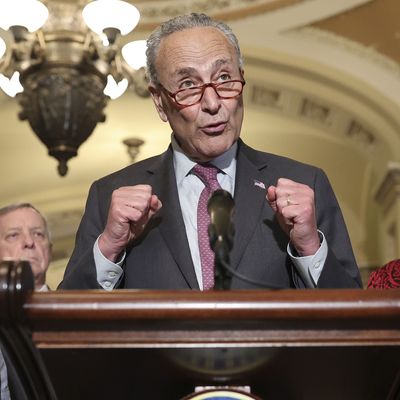
Senate Majority Leader Chuck Schumer emerged from a meeting with Democrats on the Budget Committee Tuesday night and surprised the political world: An intra-Democratic deal had been reached on a mega-reconciliation bill to pass much of Joe Biden’s respective jobs and families plans. Among many other things, the ultimate legislation can be expected to make permanent many of the low-income support provisions enacted in the American Rescue Plan earlier this year, while making college more affordable, expanding pre-K education and child care assistance, continuing Obamacare’s health care improvements, and addressing climate change.
The tentative deal is pretty bare-bones but significant: (1) a compromise top-line spending figure of $3.5 trillion, between the $6 trillion the budget chairman Bernie Sanders has talked about and the $2 trillion or so key Senate swing vote Joe Manchin has been thought to favor; (2) a commitment to “fully pay for” new spending, with the proviso that there will be no tax increases for individuals earning less than $400,000 or for small businesses; and (3) an additional commitment to include new Medicare vision and dental benefits, and “major” climate-change provisions.
It appears the White House has signed off on this framework, and President Biden himself will give it a boost on Wednesday at a full meeting of Senate Democrats. The idea is to pass a budget resolution (which cannot be filibustered by Republicans) before the August recess to prepare the way for a huge budget-reconciliation bill implementing it, which will be prepared for action in the fall.
While Sanders’s sign-off was a good indication that Senate progressives (and probably their House counterparts) are onboard so far, it is less clear if Manchin and like-minded centrists are in sync, though Budget Committee member Mark Warner is probably in close touch with them.
The agreement leaves a lot of questions unresolved that will have to be answered before the budget resolution is approved on the expected party-line votes in both Houses:
Which chamber moves first?
While Democrats have fragile majorities and potential rebels in both chambers, the Senate with its West Virginia–size roadblock in Manchin has been assumed to be more difficult — and indeed, some House centrists want the Senate to move first so that they won’t be asked to vote for a controversial megapackage that subsequently dies in the Senate. It’s likely there will be a bicameral deal among Democrats before it is determined which chamber moves first.
When will more details be known?
All that’s needed for a budget resolution are top-line spending and revenue numbers and a general outline of what specific congressional committees will need to contribute to the package. More likely than not, Schumer and House Speaker Nancy Pelosi will make details known as they become essential to nailing down votes or addressing Republican attacks. There are potential sticking points too numerous to count, as you might expect from what will be (unless it significantly shrinks) the largest and most expensive legislative package in history. Again, Democrats cannot afford to lose a single Senate vote on the budget resolution or the subsequent reconciliation bill, and Pelosi’s margin in the House currently stands at five votes.
One particular hazard for Democrats (as it was during the earlier FY 2021 budget process when a $15 minimum wage was tossed out of the COVID-19 stimulus bill in the Senate) involves the Senate’s Byrd Rule restriction on what can go into a budget-reconciliation bill. Some House progressives are demanding that the megapackage include immigration provisions such as a path to citizenship for Dreamers. If the Senate parliamentarian rules these or other provisions non-germane and thus excluded from a reconciliation bill, the whole deal could be endangered.
Why did the agreement specify Medicare and climate-change provisions along with limits on tax increases?
These were the most prominent issues barring the most basic kind of agreement. Progressives have been worried all along that climate-change provisions would get short shrift in this package, thanks to potential objections from Manchin and other senators from energy-producing states. And expanding Medicare benefits is sort of a consolation prize for the absence of any broad-based universal health-coverage plan (it’s also likely to be very popular). The limits on where revenue “pay-for” provisions would be found echoes Biden’s promises on the campaign trail, and the fears of centrist Democrats that the whole package would be described by Republicans as a classic tax-and-spend monstrosity.
What’s the relationship between this bill and the bipartisan infrastructure bill?
This remains the most complicated question of the entire year, and the one that gives Republicans their only leverage over budget legislation that does not require their votes. Negotiations on the details of the bipartisan infrastructure agreement announced at the White House on June 24 are supposed to conclude this week, and the key issue is whether the ten Republican senators needed to overcome a filibuster threat will stay onboard. Manchin and his centrist allies, and Biden, are heavily invested in a deal, which means Senate Republicans can use their essential participation to influence the budget resolution and reconciliation bills.
Pelosi has made it clear she will not move on any of these big pieces of legislation until the votes for Senate passage of all of them is more or less assured. One reason for proceeding that way is simple: If the infrastructure deal falls apart, the subsequent budget-reconciliation legislation would need to be adjusted to take care of the needs the bipartisan bill is expected to address.
The best way to look at this is that Manchin is still the key to the entire scheme: If he remains onboard the budget-resolution and the budget-reconciliation bill, the odds for passage of a bipartisan infrastructure bill rise as well. But if Republicans sabotage the infrastructure deal, tensions between Democratic centrists and progressives over the budget bills could become even more intense since this will be the ball game for major legislation in 2021.






























